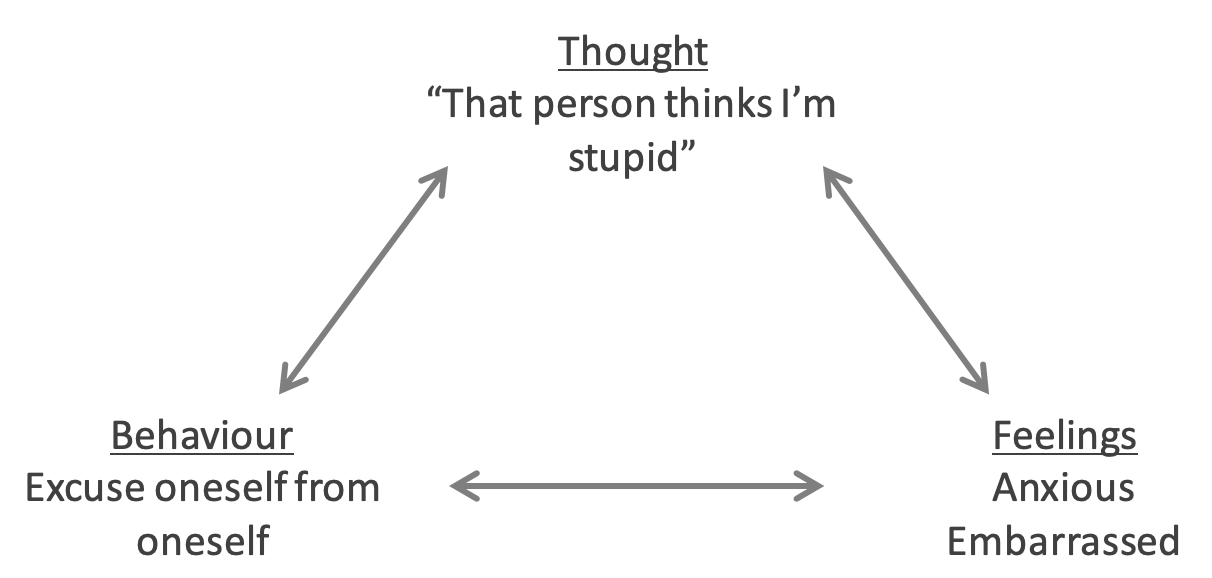
Cognitive behavioural Therapy (CBT) for Social Anxiety Treatment
Cognitive behavioural therapy (or CBT) is the most effective psychological treatment for social anxiety¹.
CBT is also very practical in the way it teaches strategies and techniques to manage symptoms. CBT aims to empower an individual with knowledge about what causes social anxiety and how to reduce distress.
There are 3 main areas that a psychologist using CBT will address:
- Your feelings. Usually social anxiety is experienced as a racing heart, pain in the chest, blushing in the face and neck, sweating, stuttered or excessive speech, shortness of breath and trembling in the hands.
- Your thoughts. People tend to experience negative thoughts about how others perceive them. For example, you may think others are judging you or think you’re unlikable or boring. You may also find yourself scrutinising yourself after a social event.
- Your behaviours. Typically, people with social anxiety avoid situations they fear being embarrassed or plan ahead for a ‘quick exit’ (for example, they may sit by the door of a café or lecture theatre). As well, individuals with social anxiety may find ways to “protect” themselves from socialising (for example, using their phone at a social gathering or talking only to people they know).
A CBT psychologist addresses these 3 areas, because our feelings, thoughts and behaviours all interact to worsen social anxiety symptoms. This is best demonstrated through an example – the diagram below shows an interaction between feelings, thoughts and behaviours when someone is feeling anxious talking to someone at a party:

Anxious feelings cause us to look externally for a threat – in this case, you may think someone “thinks you’re stupid”.
Anxious feelings create a ‘fight or flight’ response – in this case, your behaviour is to flee and excuse oneself from the conversation.
Behaviour to excuse oneself from the conversation maintains your fear – in this case, you’ve denied yourself the opportunity for your anxious feelings to resolve.
Your behaviour of excusing oneself from the conversation also denies you the opportunity to think differently about yourself – perhaps if you continued the conversation, you’d see the person thought you were interesting.
Your thought that a person “thinks you’re stupid” naturally makes you feel anxious, as you’re perceiving a threat in the situation.
Your thought that a person “thinks you’re stupid” also makes you want to run away or hide, so naturally your behaviour will lead you to leave the situation.
Social anxiety treatment steps with CBT
- Your psychologist will help you understand what’s causing your social anxiety.
- Your psychologist will provide you 1-2 strategies to help you reduce anxiety feelings.
- Using specific situations, your psychologist will help you identify underlying thoughts to your anxiety.
- Your psychologist will challenge these thoughts to help you gain a rational perspective. You will learn this strategy to practise yourself.
- You will plan with your psychologist to gradually reduce behaviours where you avoid or protect yourself from anxious situations.
- You will continue to practise strategies learnt both inside and outside session, whilst continuing to review progress made and addressing any obstacles along the way.
Social Anxiety Treatment using CBT at Peaceful Mind Psychology
Our team of psychologists are well trained in social anxiety treatment using CBT and other evidence-based therapies, such as Acceptance and Commitment Therapy and Mindfulness. In our experience, CBT for anxiety is the most effective treatment in producing positive outcomes in a time effective manner. Call us today to be professionally matched to a psychologist who suits your needs. You can also start to learn some strategies in blog post How to Manage Social Anxiety.
